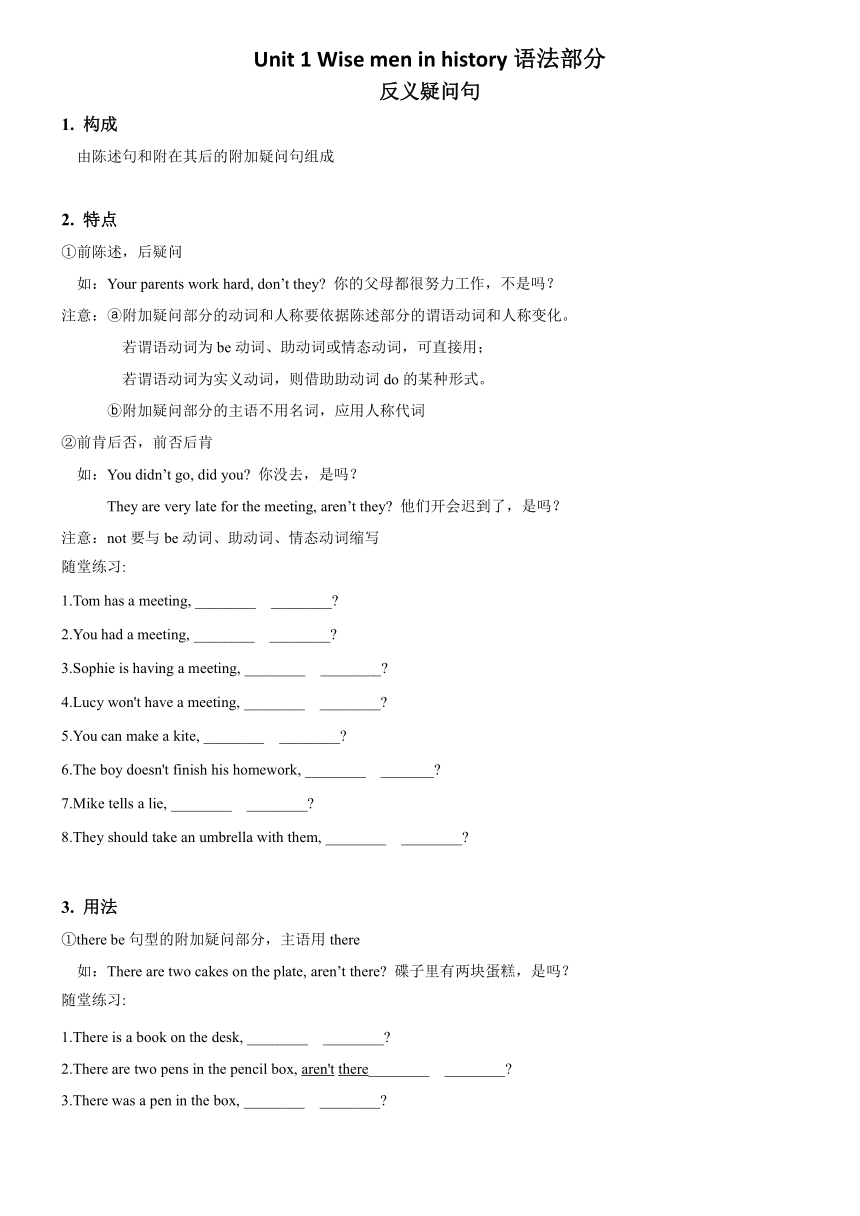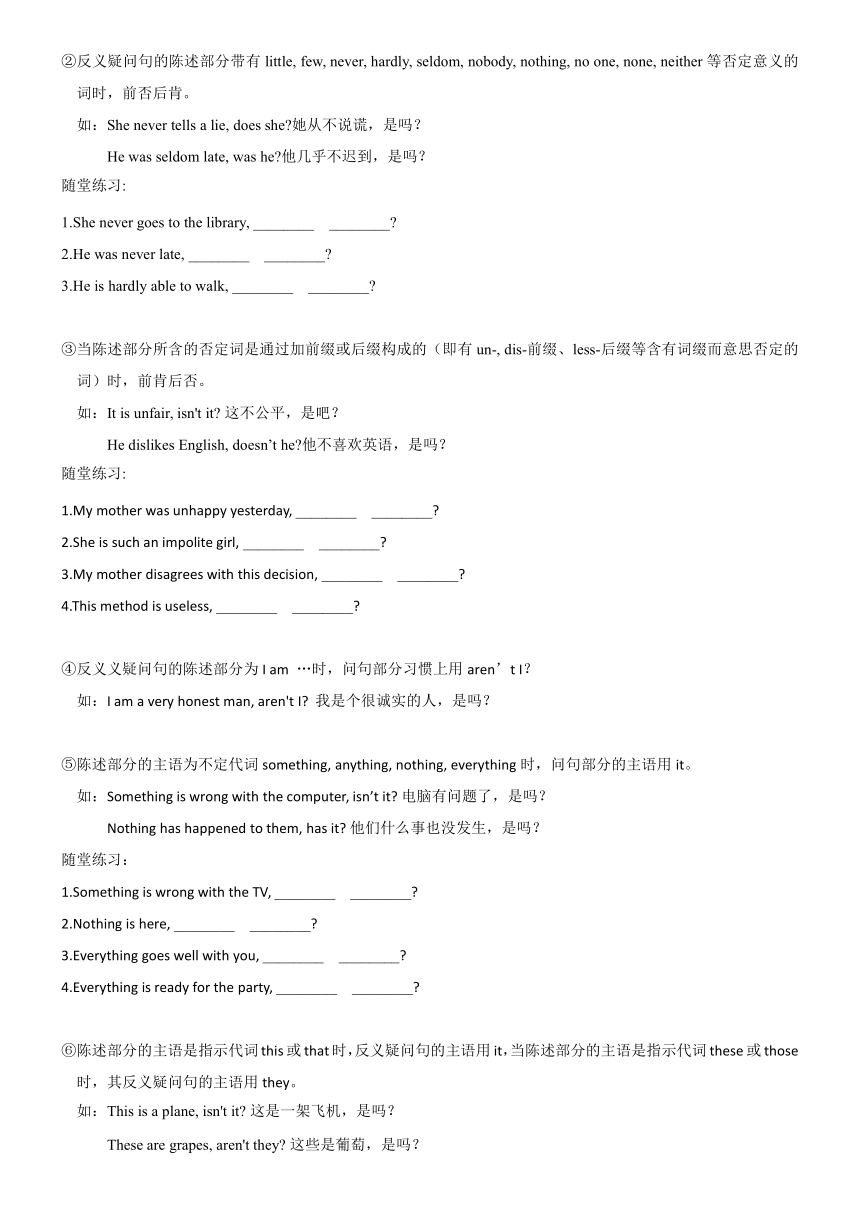Unit 1 Know yourself语法Grammar 反义疑问句练习(含答案)牛津深圳版九年级英语上册
文档属性
| 名称 | Unit 1 Know yourself语法Grammar 反义疑问句练习(含答案)牛津深圳版九年级英语上册 |  | |
| 格式 | docx | ||
| 文件大小 | 22.1KB | ||
| 资源类型 | 教案 | ||
| 版本资源 | 牛津译林版 | ||
| 科目 | 英语 | ||
| 更新时间 | 2024-09-10 14:19:46 | ||
图片预览


文档简介
Unit 1 Wise men in history语法部分
反义疑问句
构成
由陈述句和附在其后的附加疑问句组成
特点
①前陈述,后疑问
如:Your parents work hard, don’t they 你的父母都很努力工作,不是吗?
注意: 附加疑问部分的动词和人称要依据陈述部分的谓语动词和人称变化。
若谓语动词为be动词、助动词或情态动词,可直接用;
若谓语动词为实义动词,则借助助动词do的某种形式。
附加疑问部分的主语不用名词,应用人称代词
②前肯后否,前否后肯
如:You didn’t go, did you 你没去,是吗?
They are very late for the meeting, aren’t they 他们开会迟到了,是吗?
注意:not要与be动词、助动词、情态动词缩写
随堂练习:
1.Tom has a meeting, ________ ________
2.You had a meeting, ________ ________
3.Sophie is having a meeting, ________ ________
4.Lucy won't have a meeting, ________ ________
5.You can make a kite, ________ ________
6.The boy doesn't finish his homework, ________ _______
7.Mike tells a lie, ________ ________
8.They should take an umbrella with them, ________ ________
用法
①there be句型的附加疑问部分,主语用there
如:There are two cakes on the plate, aren’t there 碟子里有两块蛋糕,是吗?
随堂练习:
1.There is a book on the desk, ________ ________
2.There are two pens in the pencil box, aren't there________ ________
3.There was a pen in the box, ________ ________
②反义疑问句的陈述部分带有little, few, never, hardly, seldom, nobody, nothing, no one, none, neither等否定意义的词时,前否后肯。
如:She never tells a lie, does she 她从不说谎,是吗?
He was seldom late, was he 他几乎不迟到,是吗?
随堂练习:
1.She never goes to the library, ________ ________
2.He was never late, ________ ________
3.He is hardly able to walk, ________ ________
③当陈述部分所含的否定词是通过加前缀或后缀构成的(即有un-, dis-前缀、less-后缀等含有词缀而意思否定的词)时,前肯后否。
如:It is unfair, isn't it 这不公平,是吧?
He dislikes English, doesn’t he 他不喜欢英语,是吗?
随堂练习:
1.My mother was unhappy yesterday, ________ ________
2.She is such an impolite girl, ________ ________
3.My mother disagrees with this decision, ________ ________
4.This method is useless, ________ ________
④反义义疑问句的陈述部分为I am …时,问句部分习惯上用aren’t I?
如:I am a very honest man, aren't I 我是个很诚实的人,是吗?
⑤陈述部分的主语为不定代词something, anything, nothing, everything时,问句部分的主语用it。
如:Something is wrong with the computer, isn’t it 电脑有问题了,是吗?
Nothing has happened to them, has it 他们什么事也没发生,是吗?
随堂练习:
1.Something is wrong with the TV, ________ ________
2.Nothing is here, ________ ________
3.Everything goes well with you, ________ ________
4.Everything is ready for the party, ________ ________
⑥陈述部分的主语是指示代词this或that时,反义疑问句的主语用it,当陈述部分的主语是指示代词these或those时,其反义疑问句的主语用they。
如:This is a plane, isn't it 这是一架飞机,是吗?
These are grapes, aren't they 这些是葡萄,是吗?
随堂练习:
1.This is a yellow pencil, ________ ________
2.These are cakes, ________ ________
3.That is a monkey, ________ ________
4.Those are school bags, ________ ________
⑦陈述部分的主语为不定代词somebody (someone), anybody (anyone), nobody (no one), everybody (everyone) none, neither时,问句部分的主语用he(某人)或they(所有人/每个人),此时问句动词的数应和he或they一致。
如:Someone has taken the seat, hasn’t he 有人已经坐了位置,是吗?
Everyone has done their best in the game, haven’t they 每个人在比赛中已经尽力了,是吗?
随堂练习:
1.Nobody was late for the class, ________ ________
2.Someone is waiting for you at the school gate, ________ ________
⑧当陈述部分谓语动词是need,且被用作实义动词时,其反意疑问句需用do的适当形式。若need 为情态动词(通常用于疑问句和否定句中,无人称和数的变化),疑问部分用need构成。
如:We need to help them, don’t we 我们得帮他们,对吗?
You needn’t go there, need you 你不必去那儿,是吗?
随堂练习:
1.We need not do it again, ________ ________
2.He does not need it any more, ________ ________
⑨陈述部分为祈使句时,疑问部分根据不同情况使用不同的情态动词:
(1)若为let’s引导,疑问部分用shall we
如:Let’s go home together, shall we 让我们一起回家,好吗?
(2)若为let us引导,疑问部分用will you?
如:Let us stop to rest, will you 让我们停下休息,好吗?
(3)若为否定祈使句,疑问部分用will you?
如:Don’t make any noise, will you 别弄出噪音,好吗?
(4)若为肯定祈使句,疑问部分用will you 或won’t you 都可以
如:Do sit down, won’t you / will you 请坐,好吗?
Please open the window, will you (won’t you ) 打开窗,好吗?
随堂练习:
1.Open the window, ________ ________
2.Don't forget, ________ ________
3.Let's take a bus, ________ ________
4.Let us know your phone number, ________ ________
⑩陈述部分是主从复合句时,疑问部分主语通常与主句主语一致。
如:She said she would come tomorrow, didn’t she 她说她明天不会来,是吗?
注意:但主句主语为第一人称I/We,谓语动词是think, believe, imagine, expect等时,反义疑问句主语常与从句主语一致,并注意还原否定转移,以确定疑问部分的形式。
如:I think he is a good student, isn’t he 我觉得他是个好学生,对吗(他是吗)?
I don’t think he will come, will he 我认为他不会来,对吗(他会来吗)?
随堂练习:
1.They all think that English is very useful, ________ ________
2.I think he is a good student, ________ ________
3.We don't believe that the news is true, ________ ________
4.I don't think that you can do it, ________ ________
综合练习:
1.I don't think that the necklace is made of diamond,________ ________
2.No one left here yesterday,________ ________
3.Birds rarely build nests in our garden,________ ________
4.Learning how to repair motors takes a long time,________ ________
5.Let's start out early tomorrow morning,________ ________
6.There's not much news in today's newspaper,________ ________
7.She is unfit for the position,________ ________
8.She's been a worker here for many years,________ ________
9.Tom has lived here for many years,________ ________
10.Let me sing a song for you,________ ________
11.There won't be any meetings next week,________ ________
12.I don't believe he studies harder,________ ________
1.is it 2.did they 3.do they 4.doesn't it 5.shall we 6.is there 7.isn't she 8.hasn't she
1.hasn't he 2.will you 3.will there 4.does he
反义疑问句
构成
由陈述句和附在其后的附加疑问句组成
特点
①前陈述,后疑问
如:Your parents work hard, don’t they 你的父母都很努力工作,不是吗?
注意: 附加疑问部分的动词和人称要依据陈述部分的谓语动词和人称变化。
若谓语动词为be动词、助动词或情态动词,可直接用;
若谓语动词为实义动词,则借助助动词do的某种形式。
附加疑问部分的主语不用名词,应用人称代词
②前肯后否,前否后肯
如:You didn’t go, did you 你没去,是吗?
They are very late for the meeting, aren’t they 他们开会迟到了,是吗?
注意:not要与be动词、助动词、情态动词缩写
随堂练习:
1.Tom has a meeting, ________ ________
2.You had a meeting, ________ ________
3.Sophie is having a meeting, ________ ________
4.Lucy won't have a meeting, ________ ________
5.You can make a kite, ________ ________
6.The boy doesn't finish his homework, ________ _______
7.Mike tells a lie, ________ ________
8.They should take an umbrella with them, ________ ________
用法
①there be句型的附加疑问部分,主语用there
如:There are two cakes on the plate, aren’t there 碟子里有两块蛋糕,是吗?
随堂练习:
1.There is a book on the desk, ________ ________
2.There are two pens in the pencil box, aren't there________ ________
3.There was a pen in the box, ________ ________
②反义疑问句的陈述部分带有little, few, never, hardly, seldom, nobody, nothing, no one, none, neither等否定意义的词时,前否后肯。
如:She never tells a lie, does she 她从不说谎,是吗?
He was seldom late, was he 他几乎不迟到,是吗?
随堂练习:
1.She never goes to the library, ________ ________
2.He was never late, ________ ________
3.He is hardly able to walk, ________ ________
③当陈述部分所含的否定词是通过加前缀或后缀构成的(即有un-, dis-前缀、less-后缀等含有词缀而意思否定的词)时,前肯后否。
如:It is unfair, isn't it 这不公平,是吧?
He dislikes English, doesn’t he 他不喜欢英语,是吗?
随堂练习:
1.My mother was unhappy yesterday, ________ ________
2.She is such an impolite girl, ________ ________
3.My mother disagrees with this decision, ________ ________
4.This method is useless, ________ ________
④反义义疑问句的陈述部分为I am …时,问句部分习惯上用aren’t I?
如:I am a very honest man, aren't I 我是个很诚实的人,是吗?
⑤陈述部分的主语为不定代词something, anything, nothing, everything时,问句部分的主语用it。
如:Something is wrong with the computer, isn’t it 电脑有问题了,是吗?
Nothing has happened to them, has it 他们什么事也没发生,是吗?
随堂练习:
1.Something is wrong with the TV, ________ ________
2.Nothing is here, ________ ________
3.Everything goes well with you, ________ ________
4.Everything is ready for the party, ________ ________
⑥陈述部分的主语是指示代词this或that时,反义疑问句的主语用it,当陈述部分的主语是指示代词these或those时,其反义疑问句的主语用they。
如:This is a plane, isn't it 这是一架飞机,是吗?
These are grapes, aren't they 这些是葡萄,是吗?
随堂练习:
1.This is a yellow pencil, ________ ________
2.These are cakes, ________ ________
3.That is a monkey, ________ ________
4.Those are school bags, ________ ________
⑦陈述部分的主语为不定代词somebody (someone), anybody (anyone), nobody (no one), everybody (everyone) none, neither时,问句部分的主语用he(某人)或they(所有人/每个人),此时问句动词的数应和he或they一致。
如:Someone has taken the seat, hasn’t he 有人已经坐了位置,是吗?
Everyone has done their best in the game, haven’t they 每个人在比赛中已经尽力了,是吗?
随堂练习:
1.Nobody was late for the class, ________ ________
2.Someone is waiting for you at the school gate, ________ ________
⑧当陈述部分谓语动词是need,且被用作实义动词时,其反意疑问句需用do的适当形式。若need 为情态动词(通常用于疑问句和否定句中,无人称和数的变化),疑问部分用need构成。
如:We need to help them, don’t we 我们得帮他们,对吗?
You needn’t go there, need you 你不必去那儿,是吗?
随堂练习:
1.We need not do it again, ________ ________
2.He does not need it any more, ________ ________
⑨陈述部分为祈使句时,疑问部分根据不同情况使用不同的情态动词:
(1)若为let’s引导,疑问部分用shall we
如:Let’s go home together, shall we 让我们一起回家,好吗?
(2)若为let us引导,疑问部分用will you?
如:Let us stop to rest, will you 让我们停下休息,好吗?
(3)若为否定祈使句,疑问部分用will you?
如:Don’t make any noise, will you 别弄出噪音,好吗?
(4)若为肯定祈使句,疑问部分用will you 或won’t you 都可以
如:Do sit down, won’t you / will you 请坐,好吗?
Please open the window, will you (won’t you ) 打开窗,好吗?
随堂练习:
1.Open the window, ________ ________
2.Don't forget, ________ ________
3.Let's take a bus, ________ ________
4.Let us know your phone number, ________ ________
⑩陈述部分是主从复合句时,疑问部分主语通常与主句主语一致。
如:She said she would come tomorrow, didn’t she 她说她明天不会来,是吗?
注意:但主句主语为第一人称I/We,谓语动词是think, believe, imagine, expect等时,反义疑问句主语常与从句主语一致,并注意还原否定转移,以确定疑问部分的形式。
如:I think he is a good student, isn’t he 我觉得他是个好学生,对吗(他是吗)?
I don’t think he will come, will he 我认为他不会来,对吗(他会来吗)?
随堂练习:
1.They all think that English is very useful, ________ ________
2.I think he is a good student, ________ ________
3.We don't believe that the news is true, ________ ________
4.I don't think that you can do it, ________ ________
综合练习:
1.I don't think that the necklace is made of diamond,________ ________
2.No one left here yesterday,________ ________
3.Birds rarely build nests in our garden,________ ________
4.Learning how to repair motors takes a long time,________ ________
5.Let's start out early tomorrow morning,________ ________
6.There's not much news in today's newspaper,________ ________
7.She is unfit for the position,________ ________
8.She's been a worker here for many years,________ ________
9.Tom has lived here for many years,________ ________
10.Let me sing a song for you,________ ________
11.There won't be any meetings next week,________ ________
12.I don't believe he studies harder,________ ________
1.is it 2.did they 3.do they 4.doesn't it 5.shall we 6.is there 7.isn't she 8.hasn't she
1.hasn't he 2.will you 3.will there 4.does he
